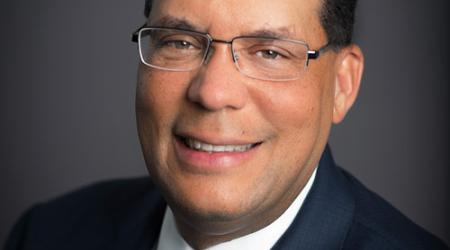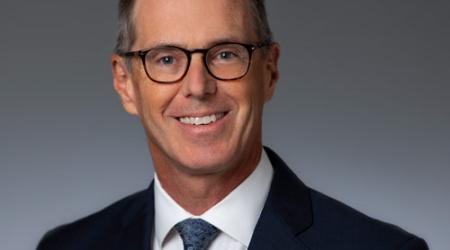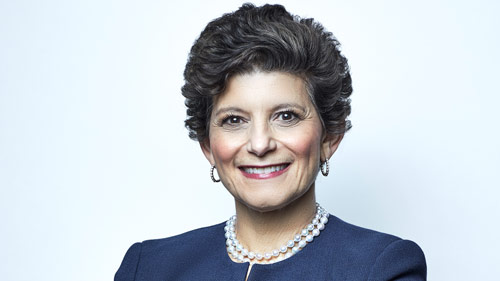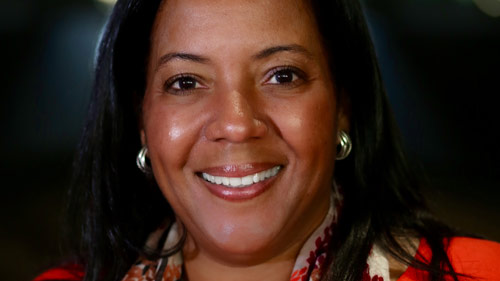The REIT industry has committed to making meaningful strides on diversity, equity, and inclusion across its ranks.
Among the many things 2020 will be remembered for is a national reckoning on race and social justice that is driving change on a number of fronts, including the commercial real estate sector.
By building upon existing efforts and launching new initiatives to promote diversity, equity, and inclusion within the REIT industry, Nareit and its membership are working to ensure that the momentum sparked in 2020 generates measurable and substantive change in the years ahead.
Even before the killing of George Floyd by police last summer fueled nationwide protests and public condemnations of systemic racism, Nareit and REITs had stepped up efforts to address social issues. Set against the backdrop of a pandemic that disproportionately impacted people of color, the events of 2020 only underscored the importance of those efforts and created a greater sense of urgency.
“I think there is a huge opportunity” to create lasting change, says Thomas Baltimore Jr., chairman, president, and CEO of Park Hotels & Resorts Inc. (NYSE: PK).
“I do not believe this is a passing fad, but a real opportunity for companies, including Park, to evaluate and upgrade their employment practices [regarding] recruiting, training, promotion, mentoring, and sponsorship,” adds Baltimore, who is part of a diverse executive management team at Park.
Together with Debra A. Cafaro, chairman and CEO of Ventas, Inc. (NYSE: VTR) and A. William Stein, CEO of Digital Realty (NYSE: DLR), Baltimore co-chairs Nareit’s new Dividends Through Diversity, Equity & Inclusion (DDEI) CEO Council.
Made up of 30 REIT CEOs, the council is leading the REIT industry’s efforts to advance actionable and sustainable plans that support the recruitment, inclusion, development, and advancement of women, professionals of color, and members of other underrepresented groups.
“The mission of the DDEI CEO Council is to address—at the highest level—the key issues and opportunities related to diversity, equity, and inclusion in the REIT and publicly traded real estate industry,” Stein explains. The council, he adds, “will provide Nareit’s leadership with recommendations to help further the association’s and the industry’s progress in this crucial area.”
A New Lens
The council was formed last November, the same month that Nareit tapped Nathaalie Carey, former COO at New York state’s Department of Labor, to serve as its new SVP for industry affairs and social responsibility. Carey is not only a former high-ranking New York state official but also served on Gov. Andrew Cuomo’s NYS Women’s Pay Equity Panel.
Now a member of Nareit’s senior leadership team, she is responsible for several key priorities, including the social elements of environmental, social, and governance (ESG) policies in the REIT community.
To advance diversity, equity, and inclusion, she’s working closely with Nareit President and CEO Steve Wechsler and founding members of the DDEI CEO Council to develop initiatives aimed at driving sustainable change. Nareit’s newly-formed Social Responsibility Council, meanwhile, is tasked with figuring out how those initiatives can be scaled across the REIT industry.
“There are so many different opportunities right now that go beyond the traditional philanthropic endeavors that many of these organizations already undertake,” Carey says, noting that she was drawn to her role at Nareit largely for the opportunity to make a difference in an industry with global impact.
Among other priorities, Carey hopes to help members of the commercial real estate community see diversity, equity, and inclusion through a new lens.
“We have to think about diversity of thought, educational background, and experience. Normally, you get diversity from looking around the table and seeing who’s missing,” whether it’s people of color, women, members of the LGBTQ community, people with disabilities, or other underrepresented groups, she explains.
Companies, she adds, may need to consider not just who’s seated around the proverbial break room table but around the boardroom table as well. Companies that need and/or want to do more when it comes to diversity and inclusion can start by reexamining their hiring and promotional practices and existing partnerships with executive search firms, Carey notes.
“There are issues to consider in terms of your organizational structure and setup if you want to make a difference,” she explains. “If you have a chief diversity officer, for instance, ask yourself what power does that person have? Is there someone who is looking unilaterally at your hiring practices and making decisions on the organization’s behalf if they see trends that may have negative impacts on any particular group of people?”
Raising the Stakes
Even REITs that have led the way on diversity and inclusion are pushing themselves harder in the wake of last summer’s civil unrest.
Consider Alexander & Baldwin, Inc. (NYSE: ALEX) (A&B), Hawaii’s largest owner of grocery-anchored neighborhood shopping centers and the silver recipient of Nareit’s 2020 Diversity, Equity & Inclusion Recognition Award. Many of A&B’s employees are women. What’s more, its workforce is already racially diverse, largely because of the demographic makeup of the state in which it operates, according to President and CEO Chris Benjamin. Hawaii is home to the nation’s largest share of multiracial Americans, according to the Pew Research Center. Only about 25% of its population is white, according to the Census Bureau.
Despite the existing diversity at A&B, the company isn’t resting on its laurels, says Benjamin, a member of Nareit’s DDEI CEO Council. “We’re a 150-year-old company that’s willing to reevaluate and redefine how we do things. We’re not stuck in our ways, and we’re not hiding from our past,” he notes.
Under Benjamin, A&B is going beyond what he calls superficial measures of diversity and exploring questions such as: “What about diversity in our senior management ranks? What may be keeping women from advancing to those ranks? Do we have native Hawaiians in those ranks? How many people do we employ from lower-income areas?”
“We’re examining everything from the holidays we celebrate to the way we recruit to the charities we support,” says Benjamin, noting that there is as much enthusiasm for diversity and inclusion in the company’s C-suite as there is among its millennial employees. That enthusiasm paved the way for the recent formation of such employee-led groups as A&B Pride, which supports LGBTQ employees, and a women’s leadership initiative.
“With respect to diversity and inclusion, it requires those people who have frankly suffered from discrimination to be very involved, but it also requires those of us with privilege who have benefitted from the system to not only endorse, but embrace [those efforts],” Benjamin says.
Institutionalizing Equity, Diversity & Inclusion
Many others in the commercial real estate sector appear to be coming around to the same idea. That represents a shift from several years ago when, on the whole, companies tended to take a fairly laissez-faire approach to diversity and inclusion, says Sudarshana Rangachary, SVP of human resources at Essex Property Trust Inc. (NYSE: ESS). Essex was a bronze winner in Nareit’s 2020 Diversity, Equity & Inclusion Recognition Awards.
“This industry previously had some challenges in recognizing that diversity, equity, and inclusion requires a more concerted effort,” she says. “There was a general feeling that things develop organically as long as you do the right thing.”
Essex revisited its ESG initiatives in early 2019 and, as a result, formed a diversity and inclusion committee, among other moves. The committee reviews and monitors activities and practices, including hiring practices that promote diversity, equal opportunity, and fair treatment for employees. Its chair reports to President and CEO Michael Schall, who, in turn, regularly updates the firm’s senior management team on the committee’s activities. Schall is also a member of Nareit’s DDEI CEO Council.
Rangachary says Essex’s “thoughtful, programmatic approach” to diversity, equity, and inclusion has helped the company make strides on a number of fronts. It has one of the most diverse workforces among apartment REITs and has no gender pay gap, she notes.
Despite the strides made, Rangachary says Essex has more work to do, which includes aiming to make its racial diversity mix even more reflective of the West Coast markets in which it operates. “I’m happy with where we are, but we recognize this is a journey. By no means do we think our work is done,” she says.
Pledges, Not Platitudes
Ventas, Inc. (NYSE: VTR), meanwhile, has also been on a years-long journey toward greater diversity and inclusion—not just because it’s the right thing to do but because it makes business sense, Cafaro says. Ventas received the gold award in Nareit’s 2020 Diversity, Equity & Inclusion Recognition Awards.
“I’ve always been motivated to build a great company and all the data show that diverse teams make better decisions and have better results,” she says.
Under Cafaro, in 2018 Ventas became the first REIT to join the CEO Action for Diversity & Inclusion initiative, a CEO-driven business commitment to advancing diversity and inclusion within the workplace.
Starting with its ESG materiality assessment in 2019, Ventas has set specific public goals with regards to gender and diversity on its board, within its leadership team, and across the organization. For instance, the company is striving for company-wide gender balance and 25% female representation within its leadership team by 2023.
The firm has long prioritized gender diversity at the board level. Since 2001, its board has had at least two female members, including Cafaro. Ventas’ board now has four female members, including Melody Barnes, a former White House domestic policy director and the company’s first Black director.
We’ve taken the momentum of external events [in 2020] to build more momentum and focus at all levels of our organization to do more, faster” with regard to diversity and inclusion, says Kelly Meissner, director of sustainability at Ventas.
Meissner says she’s convinced the REIT sector has reached an inflection point with regards to diversity and inclusion—just as it once did on the environmental front.
“This isn’t just issuing statements. This is [about] taking action: creating the framework and infrastructure to study and understand how we make progress on these issues as an industry,” she says.
Changing Hearts and Minds
What does it really mean to have a diverse and inclusive organization?
To create real, sustainable, cultural, and behavioral change, which is really the essence of diversity and inclusion, organizations must be authentic in their commitment. It can’t be a reactive response to a moment in time.
Having a diverse and inclusive organization means that people, regardless of who they are, have positive, engaging experiences. And this can only happen if organizations, and the people leading them, are intentional, have clear goals, and are held accountable for achieving those goals.
What kinds of discussions and/or initiatives have arisen at JBG SMITH as a result of the national reckoning on social justice matters?
Recent events have caused many companies to take a more proactive approach to demonstrating their commitment to diversity and inclusion. In some cases, it has created the burning platform that many organizations needed to think differently about the work and why it’s important.
However, I think time will tell whether corporations will extend their commitment beyond position statements and/or donations. Because as we know, changing the diverse landscape of senior ranks within organizations takes steadfast commitment and intentionality, as well as proper planning.
At JBG SMITH, we’ve definitely started having those conversations, even prior to recent events. From a cultural perspective, we focused on ways to engage with and hear from our employees. We launched our D&I Employee Roundtable Series and kicked it off with our “Black Voices” segment, which provided a platform for our Black employees to engage in dialogue and share how they were feeling about current events.
I also led multiple team discussions and dialogues around racial justice, implicit bias, and inclusive leadership to help create the safe spaces needed to step outside of our comfort zones and engage in meaningful conversations.
Additionally, we have integrated diversity and inclusion into our philanthropic efforts and have committed to supporting even more grass roots organizations, small and local businesses, as well as racial justice causes.
But for me personally, none of these actions happened as a result of a “national reckoning.” They happened because they are part of our strategy. While we may have adjusted the timing of certain aspects based on the external landscape, it’s important to emphasize that when diversity and inclusion is strategic—not simply a program or initiative—these are the types of things you should be doing anyway. And they should continue well beyond the moment.
How can REITs work to ensure that the focus on diversity and inclusion can be maintained?
It all comes down to commitment and intentionality. Focusing on diversity and inclusion beyond a moment in time means that organizations must implement changes that are sustainable and build infrastructures that will continue to yield the results that they want to see. Having a comprehensive, multi-year strategy with clear goals and measures is critical to accomplishing that.
What are the opportunities and the challenges within the commercial real estate sector for promoting greater diversity and inclusion?
Some specific opportunities include developing strategies to engage and advance diverse talent, establishing strategic partnerships to help build your brand in diverse communities, raising awareness and building diversity and inclusion competency company-wide, and ensuring that you approach everything you do with an equitable and inclusive mindset. It’s really about changing hearts and minds, which will eventually lead to changing behaviors.
But I feel the greatest opportunity continues to lie in an organization’s willingness to challenge the status quo, be intentional, and drive accountability at all levels of the organization, which again, requires solid, authentic commitment. If diversity and inclusion is truly a priority and there is explicit, genuine commitment, actions will speak far louder than words.




